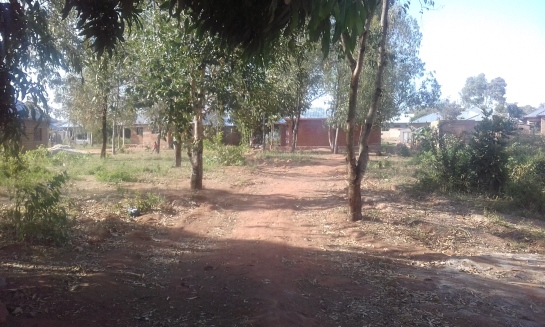Six weeks ago, I was thankful to visit the most remote church we work with, Gabimori UMC. To arrive, I travelled about an hour an a half by “small car” (they use “small car” to mean a car that works like a bus, rather than a taxi, always going the same route and waiting til full before leaving). After the small car brought me as close as it could, Musa (pictured below) took me another forty minutes by motorcycle to arrive at the village.
We have also been trying to start building the shed and “bomba” (water source) for the brick machine. While waiting for the machine, we hope Lumala UMC will use the shed and bomba to start a garden, which will increase their income, serve as a test of the church’s ability, and prepare them to manage a larger project.



In the garden planning and in the visit to Gabimori, I have seen that the leaders are confused by our insistence that they take ownership of their development. When they see mzungu missionaries and hear “development work”, they expect us to pay for and manage large charitable projects. At Gabimori, the Mzee la Kanisa (Elder of the church, pictured above) asked me if we would build a health clinic. I said something like, “We would love to, but we cannot be the ones to manage it. Next year we will train the community leaders to manage projects, and then we may help them start a clinic.” He said that sounded good, but then asked the exact same question about a school, to which I gave the same answer. This was followed by yet another (identical) exchange about us building a soccer field.
When we were planning the brick machine project, I asked two of the leaders what project they could do with the shed and bomba while we were waiting for the brick machine. They said that they could do many different projects, but the problem is that I never want to pay for all the things that they request for the projects. They then tried to convince me to start a larger project by suggesting that I would get more money from it in the long run.
This confusion has been present in many cases besides these two recent examples. The leaders are disappointed by how slow the process is, disappointed that we won’t be providing as much money as they are used to, and doubtful of their ability to ever start and manage the projects themselves.
I am never sure what to say when we have these conversations. I have tried to explain how the old way created dependency, and also that this new approach (the title means “it’s a new path”) has already been effective with churches very similar to theirs in the area (you can click the following links to see more: Shinyanga, Nyanguge, Manya Manyama, Ishishangh’olo). At the end of the day though, it will take time for the leaders to come to trust their own abilities. And so, each day is one more day to show them that we really do believe they can do this themselves.


